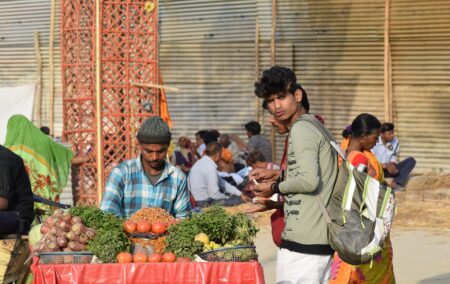The future of South Africa depends on South Africans working together to achieve shared goals. Helping one another is not just a matter of charity, it is a matter of survival. The basis for co-operation, if it is to be sustainable, must begin with our voluntary market interactions. It is important therefore that no artificial constraints be put on this interaction.
There are North Koreans who found themselves forced to turn to trade in order to survive, under a regime that hates markets and suppresses them with the full might of the state. The story of Mr Park Hyun-yong, who saw his whole family die during the famine of the late 1990s in North Korea, and of others who saw no other option but trade even as it was outlawed, is testament to how natural markets are for human beings.
In fact, some people misunderstand the nature of markets, believing they would be unable to exist without government protections for property rights. The example of North Korea and all the other ‘black markets’ that have arisen when it was necessary for human survival, in spite of and because of the government, shows the flaw in this kind of thinking. It is correct that a government restrained by a robust constitution is much less likely to restrict people’s freedom to trade, but it does not, and cannot, grant this freedom.
The freedom to trade exists even as the freedom to take a breath exists, it is part of the necessary requirements of survival as a human being, otherwise we would be reduced to the subsistence living common in the rest of nature (except the animals and plants that humans domesticate for their own survival and amusement). Indeed, this is what happens in countries where governments insist on waging war on trade; the standard of living regresses and life gets closer to the sort of wild existence some people claim would be good for us.
The capital that makes up the wealth of a society, the capital that allows for us to have infrastructure such as roads, railways, electricity, water, housing, the internet and so on, all of that requires continuous maintenance and expansion as the population grows. In order for this to happen, productive individuals in society have to choose to consume less than they produce, the difference then becomes savings, savings which are used for the formation of capital.
If you need concrete, steel, glass, wood, or American-made computers, you have to trade something of value in return, something that is a store of the productivity that created the savings in the first place. You cannot simply have the government spend as much as they want. Which idiot will continue working while other people simply put out a hand and get given free money by a government central bank?
If a government is to “invest” anything, it needs to convince or force the rest of society to give it the goods and services it needs. The current tolerance for monetary policy that is not bound by natural scarcity is a sign of the times; we have become accustomed to living off what was built by the sacrifices of those who came before us. It took real work to build the modern world. This work relied on intelligent use of scarce resources. We believe we can build an economy on stimulus.
South Africa is not yet a poor country because people still trade, we are not at war because we are engaged in voluntary transactions with one another that we all need to survive. This can only change if it is made more and more difficult to do this. The second factor is that South Africans will become poorer the less they are able to save. Maintaining and increasing capital to account for population growth will become difficult to do unless foreigners are willing to invest in this country.
Unfortunately, South African savings are in long-term decline, yet the government thinks talking about prescribed assets in this environment is a good idea. It is possible that everyone will soon discover that things like land and minerals don’t mean much unless you can use them productively.
In order for South Africans to have an intelligent policy debate on economic reform, there needs to first be an acknowledgement that trade is natural to human beings, especially during times when resources are most scarce, ie., when countries are poorest. In order for this trade to take place and grow, investments in infrastructure by individuals involved in the trade, is required. These can only be financed from capital markets, which at their root involve trading capital for return on that capital.
Of course, many people are most likely going to persist with whatever delusion is convenient for them now, until reality forces them to face the truth. If one reads economic commentary nowadays, it is clear that a significant portion of the commentariat believes we can make everyone wealthier by simply having the government spend more money, with the result that that the private sector has less available to spend. The idea is that you don’t need to work hard making yourself more productive, you can simply vote.
The views of the writer are not necessarily the views of the Daily Friend or the IRR
If you like what you have just read, subscribe to the Daily Friend
Image by Rajesh Balouria from Pixabay

